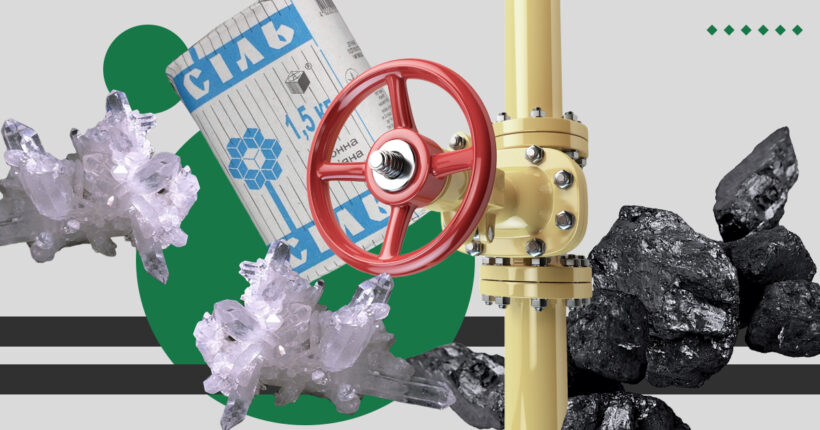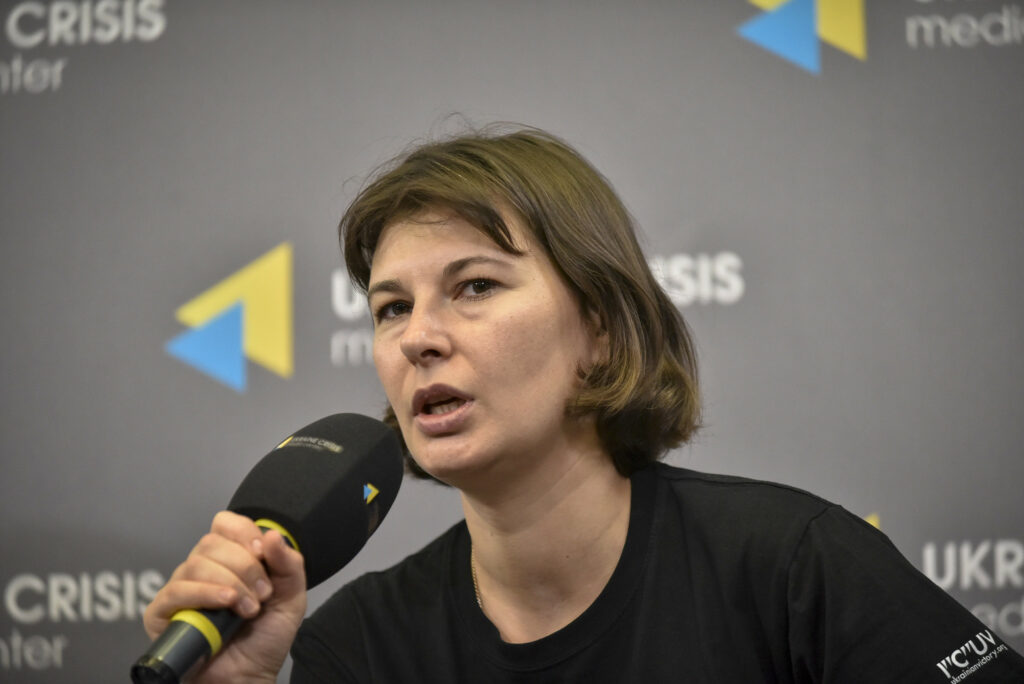
Rubryka visited the round table "Critical mineral raw materials in Ukraine – how to make them a magnet for investments, not corruption" and shared the solutions announced there.
What is the problem?
The full-scale Russian-Ukrainian war highlighted the problem of Europe's dependence on Russian gas. This was preceded by a long-standing policy of working together with Russia, which further deepened the EU's dependence on Russian goods as European countries lacked their own deposits.
After reflecting on its errors, Europe has realized that depending on a single supplier is not a wise decision. It has become evident that Russia is not the most dependable ally, so alternative solutions must be pursued.

Pipes through which Russian gas flows. Illustrative photo
Asia's market connections are currently restructuring due to many nations' abundant reserves of vital minerals. However, a dilemma arises as some countries, such as China and India, either engage in economic dealings with the aggressor state or strive to take advantage of Russia's absence and become the sole dominant player in the market.
"Probably, the European Union's policy of cooperating with Asian countries will not succeed. This is because Kazakhstan is located between Russia and China, while Japan is situated at a considerable distance," Mykhailo Honchar, an expert in international energy and security relations and President of the Center for Global Studies "Strategy XXI," shares.

Mykhailo Honchar
Ukraine is in a favorable position in this matter, with its proximity and plentiful mineral reserves, including those of great importance to Europe. As a result, in 2021, Ukraine entered into a Strategic Partnership Memorandum with the EU on critical raw materials and batteries.
Ukraine has ample opportunities and potential to continue developing its mineral resources. However, there are still a few lingering problems that hinder its progress:
- the corruption and lack of transparency in regulating subsoil use;
- the detrimental effects on the environment and locals' well-being;
- deficiencies in legislation, etc.
What is the solution?
"Transparency is a key element in preventing corruption, building a functional and sustainable raw materials sector of Ukraine, and turning it into a reliable partner on the international stage," representatives of the ANTS – National Interests Advocacy Network NGO note.

Vasyl Sehin, ANTS executive director
They teamed up with the Anti-Corruption Center NGO to conduct a study analyzing the current state of critical mineral resources and set targets for improvement.
Why should the victory of Ukraine be a priority for Europe?
Restoring control over the occupied territories is crucial, as the eastern regions are home to one of Ukraine's largest and most diverse mineral deposits. By occupying these regions, Russia can increase its natural reserves, putting Ukraine's economic and energy security at risk and hindering the EU's independence.

Infographic: Forbes
"We need to make it clear to the world that Russia's annexation of our lands not only means occupying our citizens and forcing them to serve in their military or causing harm to them. It also entails taking control of our natural resources and expanding their territory to extract crucial raw materials. Suppose they try to make us make peace by giving up our territories. In that case, we must remind them: "Do you really want the Russian Federation to maintain control over Crimean Titan [the largest manufacturer of titanium dioxide pigment in Eastern Europe – ed.]? And what will happen to the valuable lithium, titanium, and iron reserves in the Luhansk, Zaporizhzhia, and Donetsk regions?" Daria Kaleniuk, a journalist and member of the Anti-Corruption Center NGO, comments.

Daria Kaleniuk
How does it work?
The raw materials industry in Ukraine has the potential to foster international partnerships and promote independent economic growth within the country. To achieve this, it is necessary to ensure investment attractiveness and implement the solutions discussed below.
Ukraine must define its own strategy
It is essential to understand exactly how the raw materials sector should develop, what to do with the occupied subsoil, and how the development of the raw materials industry will contribute to Ukraine's economic independence and well-being.
"We must develop our own national raw materials strategy," Hanna Hopko, a chairman of the board of the ANTS – National Interests Advocacy Network NGO, says.

Hanna Hopko
The team stresses the importance of developing a methodology and examining the level of accessible resources. This will not only enable Ukraine to understand its current situation but also attract foreign partners to the natural resources sector.
Currently, data on specific minerals such as gallium and platinum group metals is classified, making it challenging to process this information. There is a discussion on the relevance of keeping this information secret for strategic purposes and whether it ultimately fosters corruption and discourages foreign investors.
Fighting corruption and eliminating "loopholes"
All subsoils are owned by the Ukrainian people and can only be provided for use. Accordingly, there are several ways for investors to obtain the right of use:
- Get a license through an online auction, which is the most transparent method. Here, investors can view available land plots on the Investment Atlas of Ukraine and buy a license through the "Prozorro. Sales" platform;
- Transfer the right to utilize land through a purchase/sale agreement;
- Obtain a license;
- Enter into a Distribution Agreement with the government for the sale of products.
"One of the main problems of PDA [Production Distribution Agreements, — ed.] in Ukraine is the lack of a standard production distribution agreement that would standardize the terms of the agreement. This means that each PDA is negotiated separately between the government and the company. As a result, there is a concern that officials may request bribes or "kickbacks" in return for more favorable terms for the company," ANTS representatives note.

Illustrative picture
Dmytro Skrylnikov adds that quite often, companies with a decent reputation in the world work according to the approach "we work as the law allows us":
"If national laws lack fair and consistent regulations that apply to everyone, any investor who comes along will inevitably exploit these loopholes."
Therefore, ensuring that corruption is prevented through legislation should be a top priority.
Implementation of ecological approach
Not adhering to environmental regulations and neglecting the environment leads to irreversible harm to nature. Taking the situation in Crimea as an illustration, we can observe the dangers of extracting raw materials without proper environmental evaluation: the devastation of Bakal Spit, detrimental alterations in Crimea's natural scenery, and the depletion of its biodiversity.
Having ecological expertise and clearly defined and observed environmental norms in subsoil use ensures Ukrainian subsoil's prolonged existence while limiting the harm done to nature and communities.
Communities' opinion is important
Local communities are directly affected by the environmental impacts of mineral extraction. This includes contaminated water, erosion, and hazardous emissions to the air and soil, which continue to pose a threat even after mining activities have ended.
According to Dmytro Skrylnikov, director of the Bureau of Environmental Investigations NGO, "public participation is all about transparency." He also notes that there have been instances where lobbyists from the extractive industry have not backed environmental legislation, and eco-activists have been targeted.

Illustrative photo
To prevent this from happening again, it is crucial to establish state oversight of environmental regulation compliance and to grant local government entities access to information regarding mining operations on their land. According to ANTS members, it would be beneficial to allocate more mining royalties to the local administrations.
Financing and attracting investors
The raw materials industry incurs high costs at every stage of operation, from geological exploration to extraction, processing, and export. State funding alone cannot cover all expenses, making the attraction of future investors and fostering continued cooperation with existing ones the most viable solution. Ukraine has already gained valuable experience collaborating with Western countries, particularly America, through its partnership with Westinghouse.
However, to incentivize partners, it's worth taking some essential steps. Firstly, make Ukrainian raw material stock information accessible. This can be achieved by digitizing geological data and making it available to everyone. Secondly, enforce international standards in the raw materials industry, which would involve extracting raw materials based on environmental evaluations, proper waste processing, and disposal methods. Lastly, the government should provide support and facilitate trade.
"And, of course, control to ensure that the representatives of the aggressor country could not enter the Ukrainian subsoil market in any way," Hanna Hopko adds.







